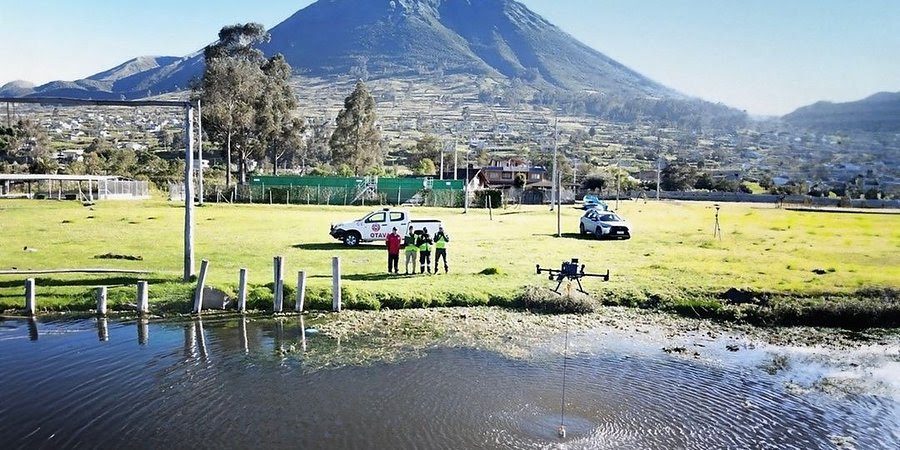Innovative Use of Drone Technology Overcomes Logistical Challenges in Search Operation
In a recent operation, a drone equipped with a Single-Beam Echo Sounder (SBES) located a sunken boat in the remote Laguna San Pablo, Ecuador. The mission demonstrated how resourceful thinking can help overcome technological limitations and environmental challenges.
Background of the Search
In July 2023, a boat carrying three people sank in Laguna San Pablo, one of Ecuador’s largest and deepest lakes. Despite extensive efforts, the local search and rescue team couldn’t find the wreck. The diving team then reached out to Aerial Development Services (ADS) for assistance.
ADS opted to use a drone-based dual-frequency echo sounder provided by SPH Engineering. This decision was made after considering that other technology, like Remotely Operated Vehicles (ROVs) with Multi-Beam Echo Sounders (MBES), would take too long to procure. Although SBES is not typically the first choice for underwater searches, it became a crucial tool in this mission. “It wasn’t a straightforward decision since the SBES is typically not the first choice for such detailed search operations. However, later, the system became an instrumental tool in the operation, showcasing how innovative thinking can often outweigh having the most advanced technology,” stated ADS.
Overcoming Significant Challenges
The operation encountered multiple obstacles:
Remote Location: Laguna San Pablo is far from major cities, making heavy equipment transportation difficult.
Distance from Shore: The boat was 450 meters from shore, which required a reliable solution for long-range detection.
High Altitude: The lake is located 2,650 meters above sea level, where thin air can affect drone performance.
Use of SBES: Unlike MBES, SBES provides less coverage per pass, necessitating a denser survey grid to locate the boat accurately.
These challenges pushed the team to maximize the potential of the technology they had on hand.
The Search Operation
ADS used a DJI RTK M350 drone integrated with SPH Engineering’s echo sounder system, supported by the UgCS flight planning software. The mission was carefully planned, with calculations made to ensure optimal survey coverage.
The drone flew over the lake at a maximum speed of 0.7 meters per second, towing the echo sounder across a 450-meter distance. The sounder’s beam width of 7° provided a footprint of 4.28 meters on the lakebed. By adjusting the distance between survey lines to 5 meters, the team achieved nearly 90% coverage of the search area.
ADS monitored real-time data from the echo sounder, which revealed anomalies matching the dimensions of the boat on the southeastern side of the search area. “The team’s ability to interpret and use the data was fundamental to the mission’s successful outcome,” ADS confirmed.
Successful Outcome
Despite SBES’s limitations, the drone successfully identified the sunken boat, showcasing how expert operation and strategic planning can lead to success even with less advanced technology. Processed data confirmed the wreck’s location, providing the local rescue team with vital information to proceed with the recovery effort.
The success of this mission highlights the potential of drone and echo sounder technology, especially in complex search operations. “As drone and echo sounder technology continues to develop, its applications in various fields will expand as it offers new solutions to complex tasks,” ADS concluded.
This case sets a precedent for using drones in challenging conditions, demonstrating the importance of adaptability and innovative thinking.
Read more:
Miriam McNabb is the Editor-in-Chief of DRONELIFE and CEO of JobForDrones, a professional drone services marketplace, and a fascinated observer of the emerging drone industry and the regulatory environment for drones. Miriam has penned over 3,000 articles focused on the commercial drone space and is an international speaker and recognized figure in the industry. Miriam has a degree from the University of Chicago and over 20 years of experience in high tech sales and marketing for new technologies.For drone industry consulting or writing, Email Miriam.
TWITTER:@spaldingbarker
Subscribe to DroneLife here.

